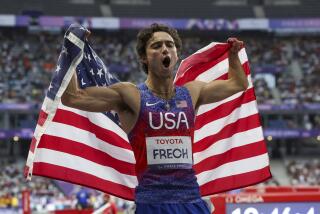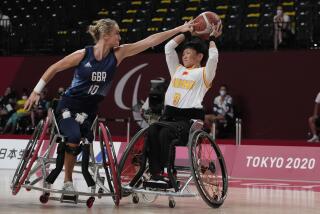U.S. Men Could Surpass 1983 Gold Total in Rome
- Share via
ROME — Mel Rosen, coach of the United States men’s track and field team, said Friday that if his athletes win six gold medals in the World Championships that begin today it will be a solid showing.
“Anything beyond that would be a very good meet,” he added.
Rosen used six as a standard because that’s how many gold medals the U.S. men won in the inaugural World Championships at Helsinki, Finland, in 1983. They also won 18 total medals but they may fall short of that output here at Olympic Stadium.
Despite Rosen’s conservatism, a reasonable projection might be eight gold medals for the U.S. men, in the 200- and 400-meter events, the 110- and 400-meter intermediate hurdles, the long and triple jumps, and the 400- and 1,600-meter relays.
Carl Lewis accounted for two gold medals at Helsinki, winning the 100 and the long jump, and shared in a third as a member of the 400-meter relay team.
Lewis also qualified for the 200 at Helsinki but didn’t compete. He is following the same format here because he wants to concentrate on the long jump in his pursuit of Bob Beamon’s world record of 29 feet 2 1/2 inches set at high altitude in the 1968 Olympic Games at Mexico City.
Rosen said he was told by Lewis’ coach, Tom Tellez, that Lewis would have competed in the 200 here if he had broken the world long jump record in the recently concluded Pan American Games at Indianapolis.
There, swirling, unpredictable winds thwarted Lewis again in his quest for that venerable record. So he settled for an effort of 28-8 1/2 while extending his long jump winning streak to 51 straight meets, dating back to 1981.
Lewis is the clear favorite to win the long jump here, even though Robert Emmiyan of the Soviet Union is entered. Emmiyan is only the second man in history to surpass the 29-foot barrier.
Emmiyan jumped 29-1 earlier in the season at high altitude in Armenia.
But Lewis and Larry Myricks, another 28-foot jumper, are skeptical of Emmiyan’s achievement.
Lewis regards Emmiyan as a 27-foot jumper, and Myricks is even more outspoken. “He will have to make me a believer,” Myricks said. “He’s going against three very serious jumpers.”
Myricks was referring to himself, Lewis and Mike Conley, another jumper in the 28-foot range.
So, there will be some intrigue in the long jump and also the 100 meters.
Lewis is no longer king of that short sprint, having lost to Canada’s Ben Johnson in their last five meetings.
The Americans dominated the sprints at Helsinki and were responsible for six medals, sweeping the 100, earning gold and silver in the 200 and setting a world record--since broken--of 37.86 seconds in winning the 400-meter relay.
That domination isn’t evident this time around.
Mary Decker Slaney accounted for the only two gold medals--in the 1,500- and 3,000-meter runs--won by American women at Helsinki. She is sitting out this season with an Achilles’ tendon injury. Also missing is sprinter Evelyn Ashford, who has a hamstring injury.
Even so, the American women may fare better here than they did in ‘83, when they earned only six medals. Eight would be a reasonable expectation.
Jackie Joyner-Kersee is regarded as a cinch to win the heptathlon, barring injury. And she may get another gold in the long jump, where she will have a showdown with East Germany’s Heike Drechsler. They are co-holders of the world record at 24-5 1/2.
American women also figure to make good showings in the sprints, 400, both relays, 400-meter hurdles and the high jump.
There is some concern about the health of some of the American men.
Edwin Moses, the two-time Olympic champion who is favored to win the 400-meter intermediate hurdles as he did in 1983, said he has been bothered by a throat ailment.
He added that other athletes feel worse than he does, particularly Butch Reynolds of Ohio State, who is favored to win the 400.
But at least the show will go on without boycotts that lowered the level of competition in the 1980 and 1984 Olympic Games. The United States and some other countries pulled out of the 1980 Moscow Games, and the Soviet Union and most of the Eastern Bloc countries retaliated by boycotting the 1984 Games in Los Angeles.
So far, there have been no political implications here. It promises to be pure track and field with more than 2,000 athletes from 170 countries prepared to compete. Competition will be televised, delayed, in the Los Angeles area today at 1 p.m., PDT, on Channels 4 and 39, and Sunday at noon on Channel 39 and at 1 p.m. on Channel 4.
A capsule look at key events:
MEN
Sprints--Carl Lewis claims that Ben Johnson benefits from a flying start, suggesting that some of his victories are tainted. Nonetheless, Johnson has twice recorded the best time ever at sea level, 9.95 seconds, and recently was timed in 9.97 while opposing a head wind in Zurich, Switzerland. Although Lewis is passing up the 200, as he did at Helsinki, the gold medal may still belong to an American. Calvin Smith, the 1983 world champion in the 200, is a slight favorite now. Carl Witherspoon, who suffered a nerve injury in his leg at the Pan American Games, is expected to compete in 100-meter heats, starting today. Floyd Heard, who was ranked No. 1 in the 200 in 1986, finished a disappointing fourth in the national meet last June. But he will get an opportunity to redeem himself, moving into the 200 field now that Lewis is passing up that race.
400 meters--Butch Reynolds has the fastest time in the world this year, 44.10, best-ever at sea level. Innocent Egbunike of Nigeria, who formerly ran for Azusa Pacific, is the only quarter miler to have beaten Reynolds this year. Reynolds is still the favorite, though. Gabriel Tiacoh of the Ivory Coast, who was ranked No. 1 in the world last year, injured his leg early in the season and his condition is doubtful. Roddie Haley and Antonio McKay of the United States have chances to earn medals.
800--It was originally believed that this would be a wide-open race. Then Kenya’s Billy Konchella ran a world’s best this season, 1 minute 43.39 seconds, at Zurich. Konchella, a one-time protege of Edwin Moses who once attended Mission Viejo High School, has been an outstanding prospect for several years. But he was restricted by injury and illness. Johnny Gray, the American record-holder at 1:42.60, hasn’t been impressive in recent races in Europe. Brazil’s Joaquim Cruz, the 1984 Olympic champion, could challenge Konchella if he has fully recovered from an injury that prevented him from competing in 1986. His countryman, Jose Luis Barbosa, could also be a factor. Britain’s Peter Elliot is a front-runner who could hang on.
1,500--Steve Scott has been America’s best miler for 10 years and finished second behind Britain’s Steve Cram in the 1983 world championships. He’ll have to improve on his finishing kick to get a medal in Rome with a field that includes Cram, Somalia’s Abde Bile and Spain’s Jose-Luis Gonzalez.
5,000--Morocco’s Said Aouita originally intended to double in the 5,000 and 10,000. But he has been bothered by an inflamed nerve in his left leg and is expected to concentrate on the 5,000. He is the world record-holder at 12:58.39. If he’s fit, the race is his. Ireland’s Eamonn Coghlan has a kicker’s chance and Spain’s Jose Abascal, a proven competitor, is moving up from the 1,500 to the 5,000.
10,000--The final was rescheduled for today in the absence of heats. With Aouita out, it’s a scramble for the gold among Italy’s Francesco Panetta, Ethiopia’s Wodajo Bulti and Mexico’s Arturo Barrios.
3,000-meter steeplechase--This race probably will go to Kenya’s Julius Korir because of his searing kick. Veteran Henry Marsh of the United States may be a medalist.
Marathon--Australia’s Rob de Castella is an experienced veteran, who is defending his 1983 championship.
110-meter hurdles--If Greg Foster doesn’t tumble, as he has in some major races, most recently the Pan Am games, he’s the class of the field.
400-meter intermediate hurdles--Edwin Moses’ nine-year winning streak is history but he’s still the man to beat. Danny Harris, who ended the streak, has an outside chance to win. Harald Schmid, the West German veteran, has been impressive in European races.
Relays--The U.S. team should win the gold unless it messes up with a spill, as it did at Helsinki in the 1,600-meter race.
Shotput--The pressure will be on Italy’s Alessandro Andrei to prove that his recent world-record throw of 75 feet 2 inches was no fluke. Udo Beyer and Ulf Timmerman of East Germany, Werner Gunthor of Switzerland, and John Brenner of the United States will apply the pressure. Trials and the final are scheduled today.
Pole vault--The Soviet Union’s Sergei Bubka, the world record-holder at 19 feet 9 inches, seemingly outclasses the field.
High jump--Another world record-breaker, Patrik Sjoberg of Sweden, will be challenged by former record-holder Igor Paklin and Gennadiy Avdeyenko, each of the Soviet Union.
Triple jump--Mike Conley is a clutch competitor in big meets and he will probably have to jump in the 58-foot range to beat Bulgaria’s Khristo Markov.
Discus--This event has dropped in quality but Cuba’s Luis Delis is a consistent performer, especially in big meets.
Javelin--In an event without a consistent winner, the edge goes to the Soviet Union’s Viktor Yevsyukov.
Hammer throw--Sergei Litvinov, the defending champion, may lead a Soviet sweep.
Decathlon--Everybody will be chasing England’s Daley Thompson, the world record-holder and 1984 Olympic champion. They won’t catch him.
WOMEN
Sprints--East Germany’s Silke Gladisch tuned up for this competition with a 100 time of 10.86 Aug. 20. She could be challenged, though, by Jamaica’s Merlene Ottey and countrywomen Marlies Gohr and Heike Drechsler. Drechsler is the co-world record-holder in the 200 at 21.71, but may not run because of a schedule conflict with the long jump. Ottey is formidable here and so is Pam Marshall of the United States.
400--Lillie Leatherwood-King of the United States has a chance for the gold against strong Eastern Bloc sprinters.
800, 1,500, 3,000--Look for domination by Eastern Europeans.
10,000--Norway’s Ingrid Kristiansen is the class of the field by about 35 seconds.
Marathon--The event will be held today. With Norway’s Grete Waitz out with an injury, Portugal’s Rosa Mota is the likely winner.
Hurdles--Bulgaria’s Yordanka Donkova and East Germany’s Cornelia Oschkenat figure to battle for the gold in the 100-meter race. Sabine Bush has a disputed world record of 53.24 in the 400-meter event. Judy Brown King of the United States has a chance to get a medal.
High jump--Stefka Kostadinova of Bulgaria is the world record-holder at 6-9 3/4.
Weight events--Look for more domination by Eastern Bloc women.
Javelin--A showdown between world record-holder Petra Felke of East Germany and former record-holder Fatima Whitbread of Great Britain.
Relays--American women will contend with East Germany for the gold in the sprint relay and then will also have the Soviet Union as a challenger in the 1,600 relay.
More to Read
Go beyond the scoreboard
Get the latest on L.A.'s teams in the daily Sports Report newsletter.
You may occasionally receive promotional content from the Los Angeles Times.







